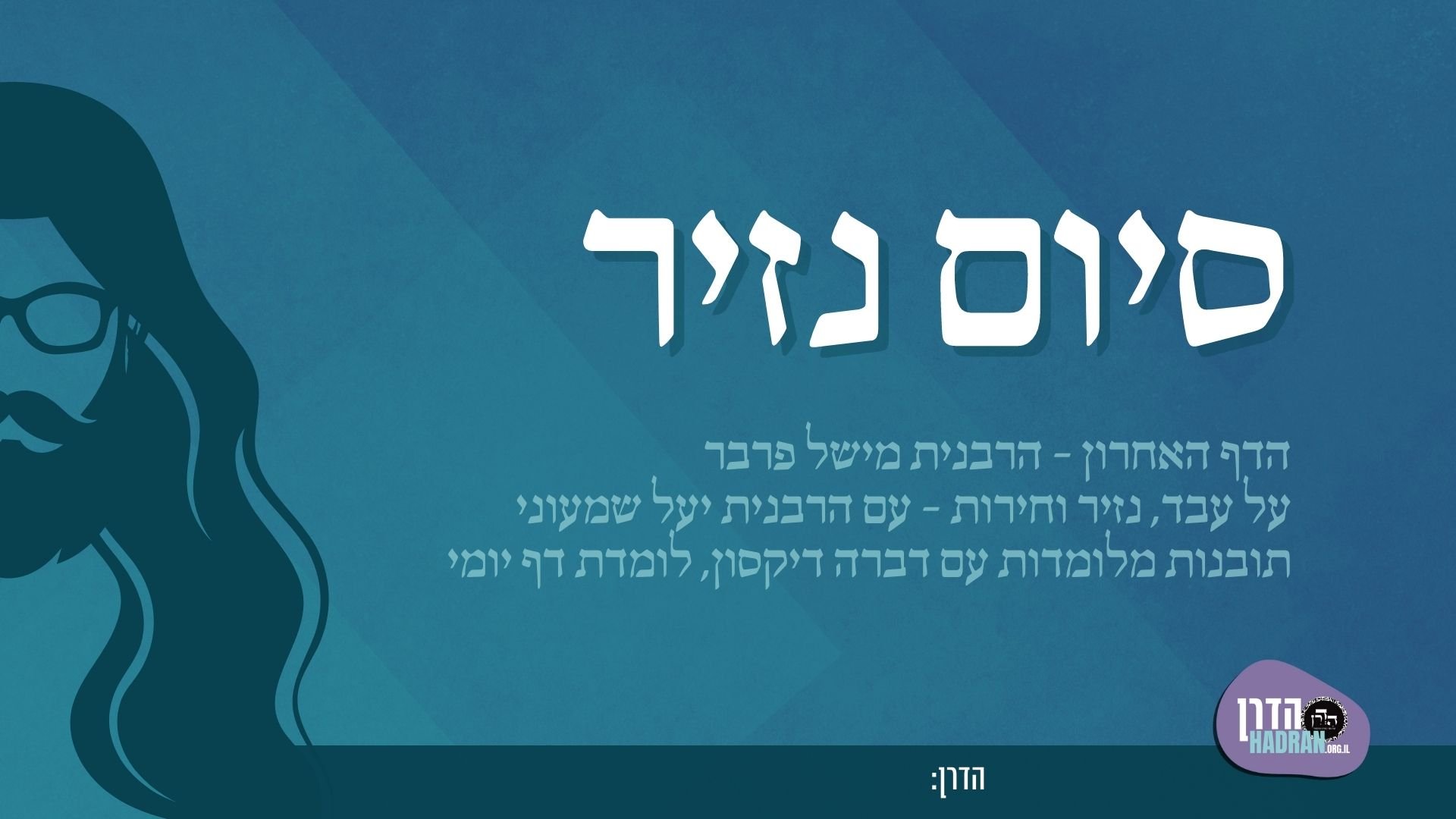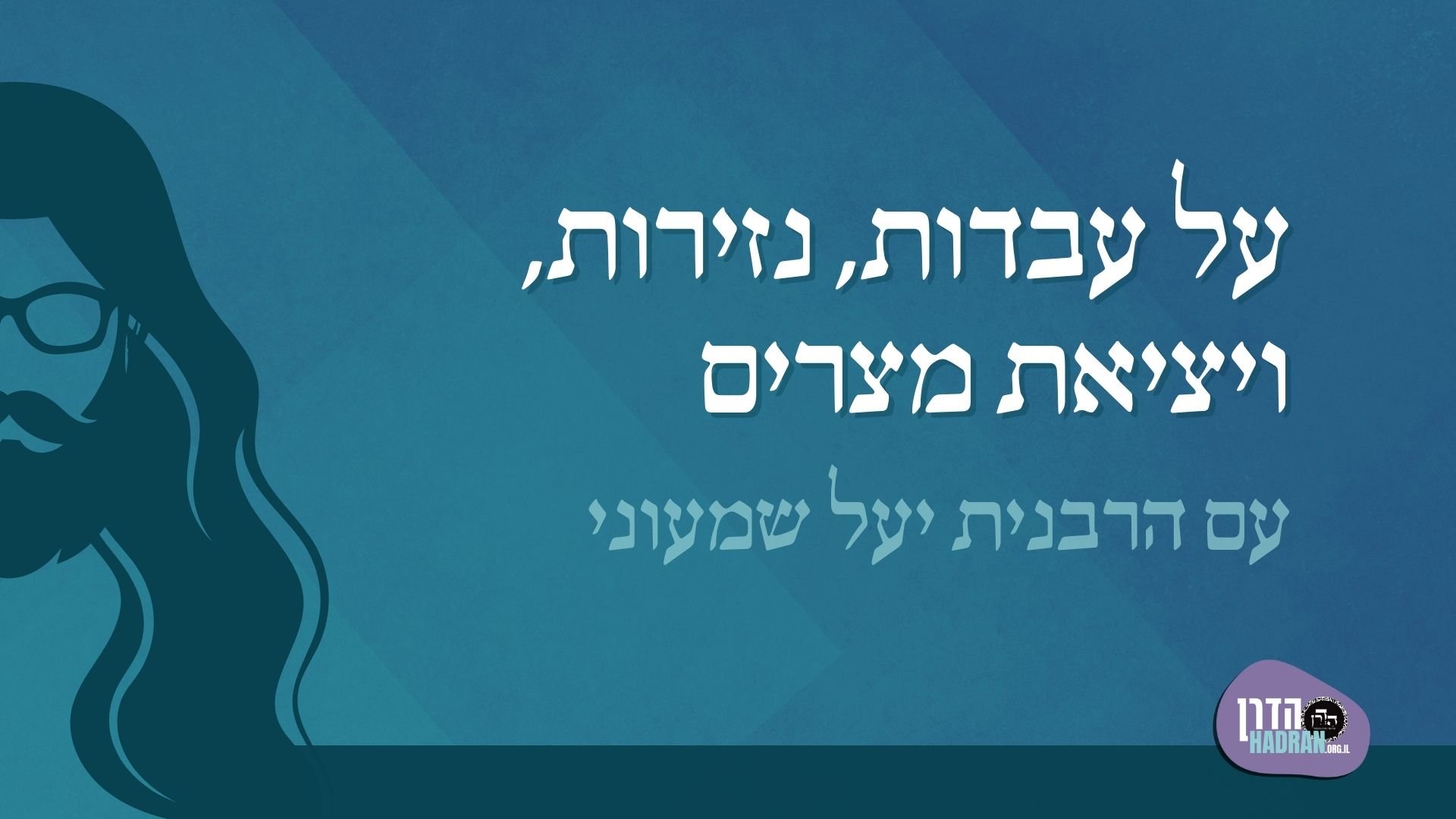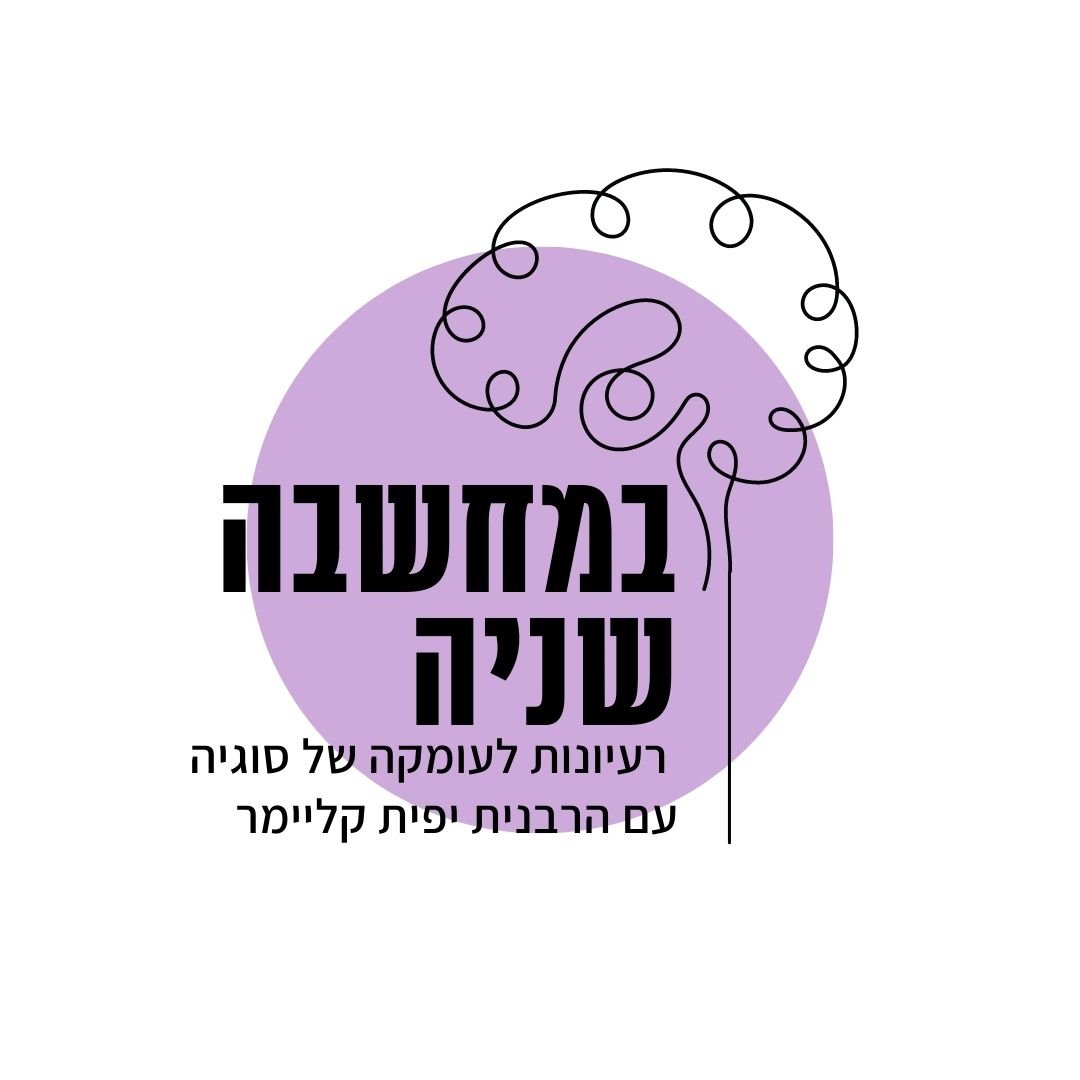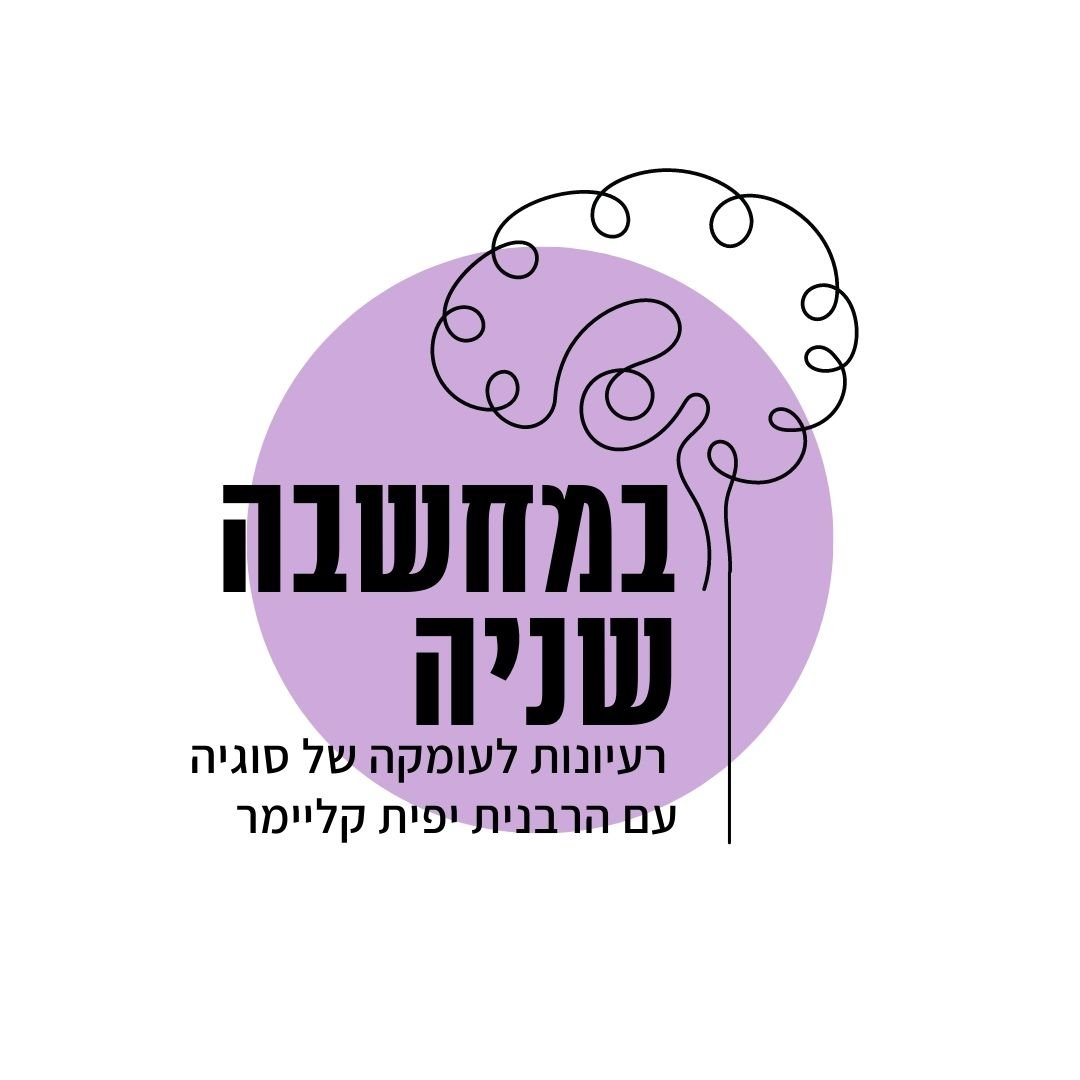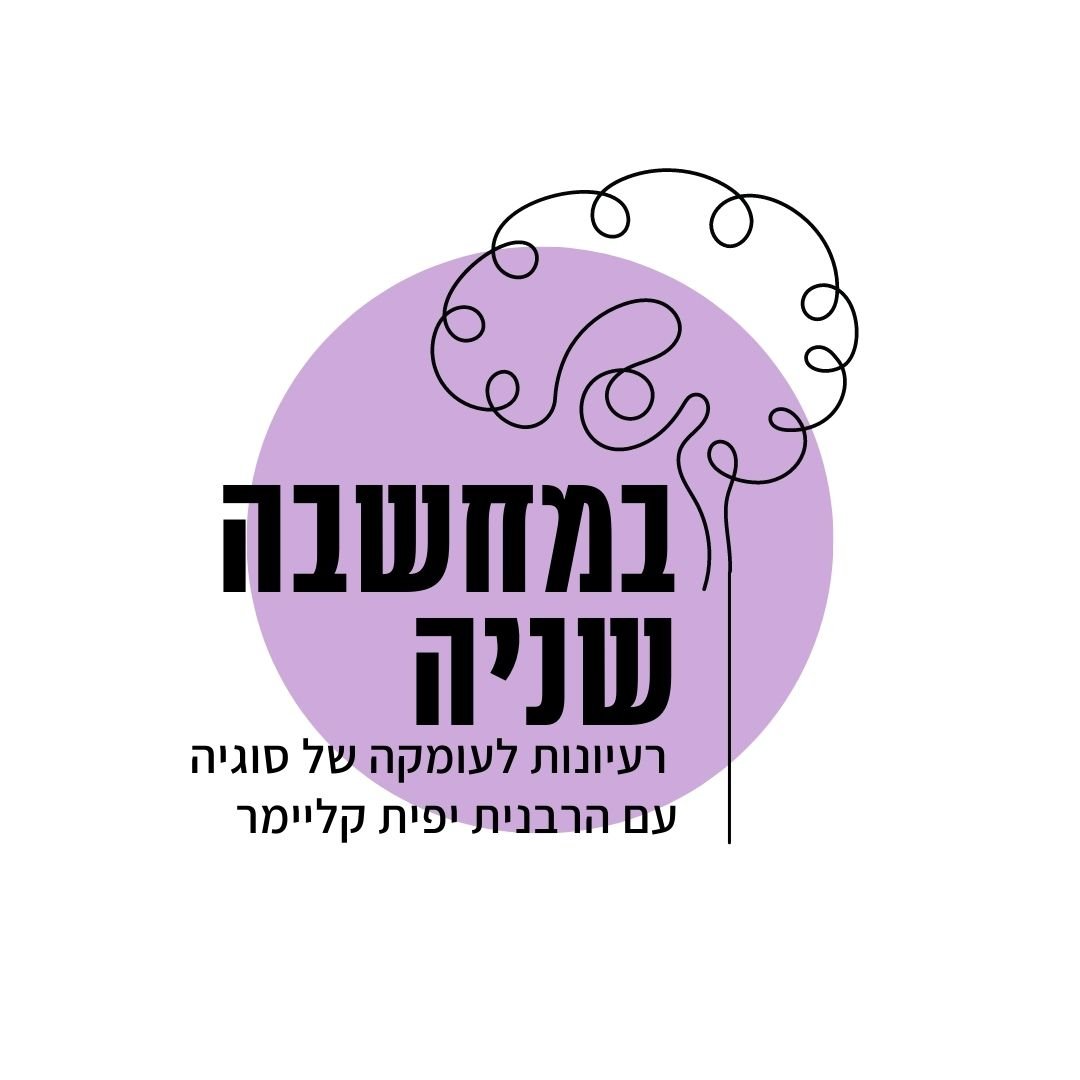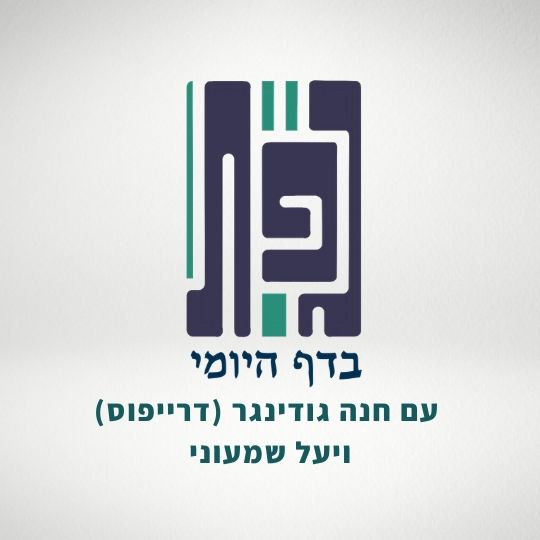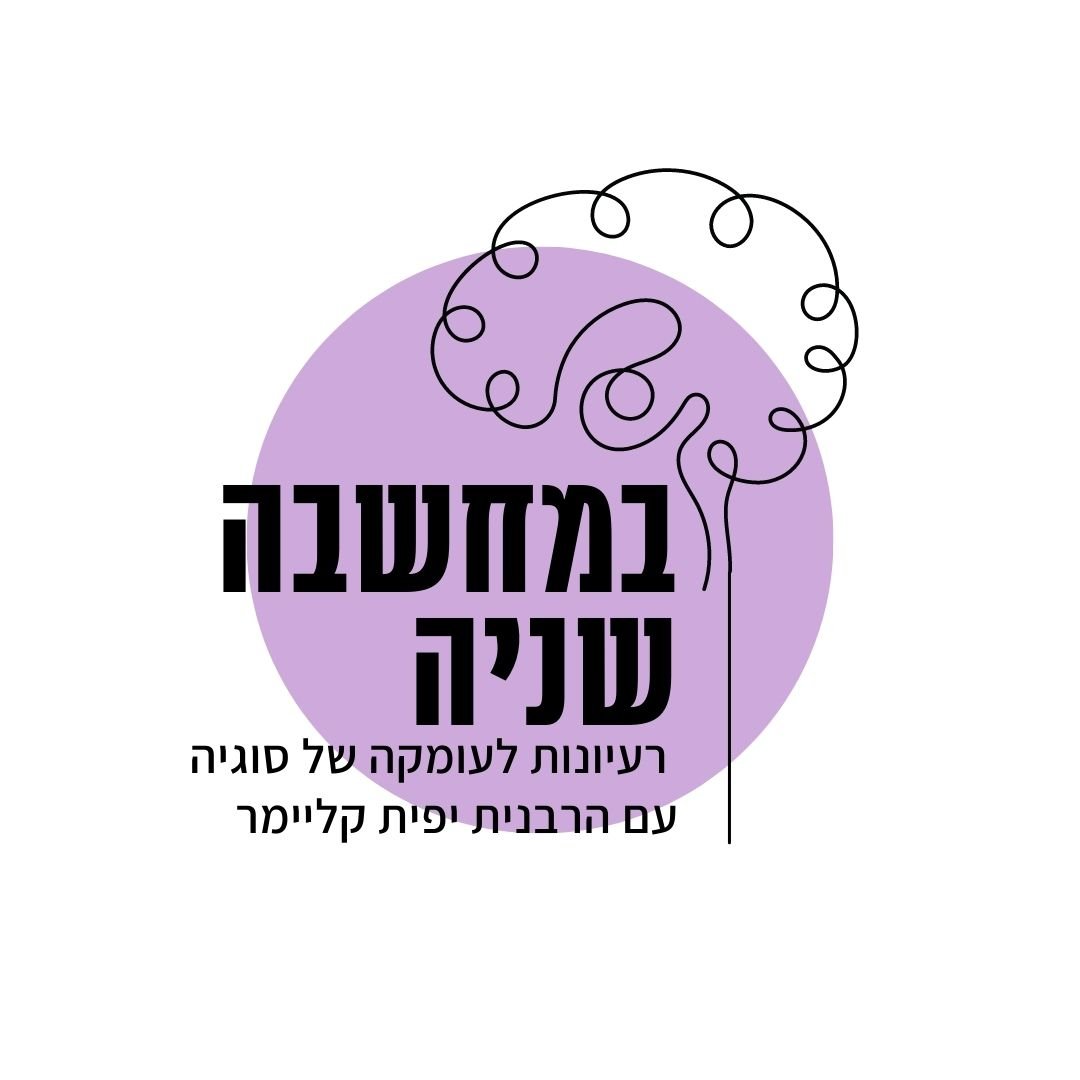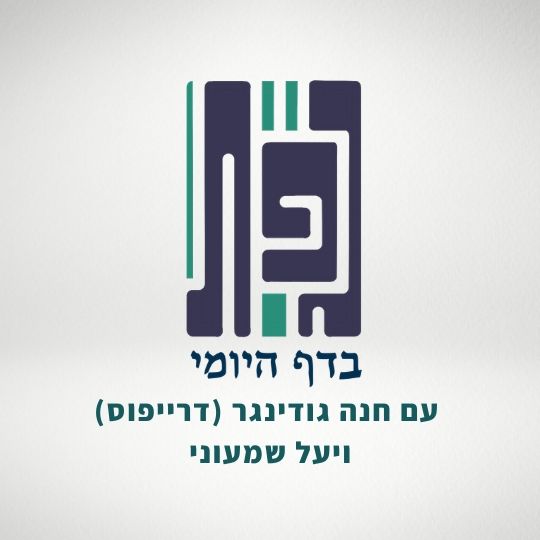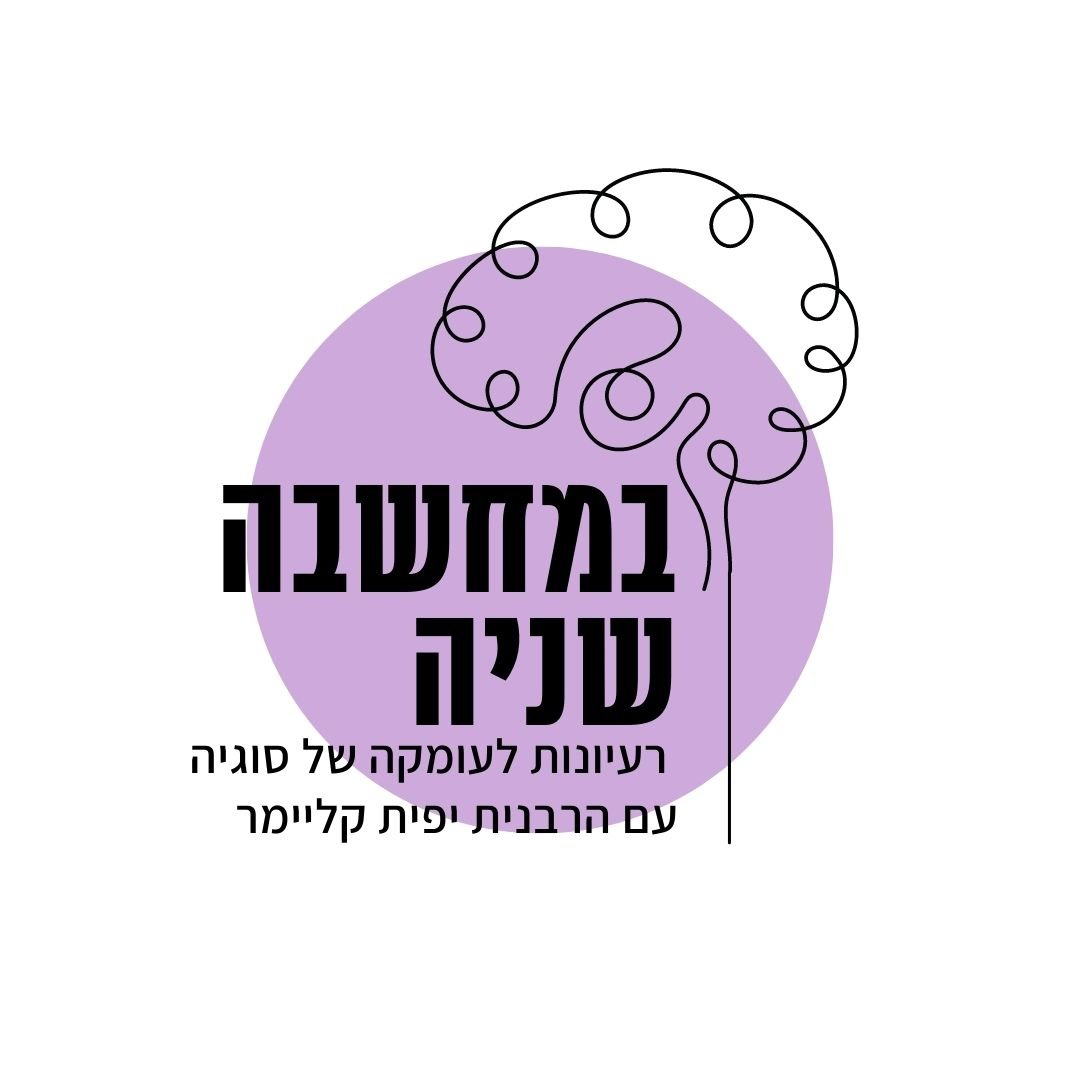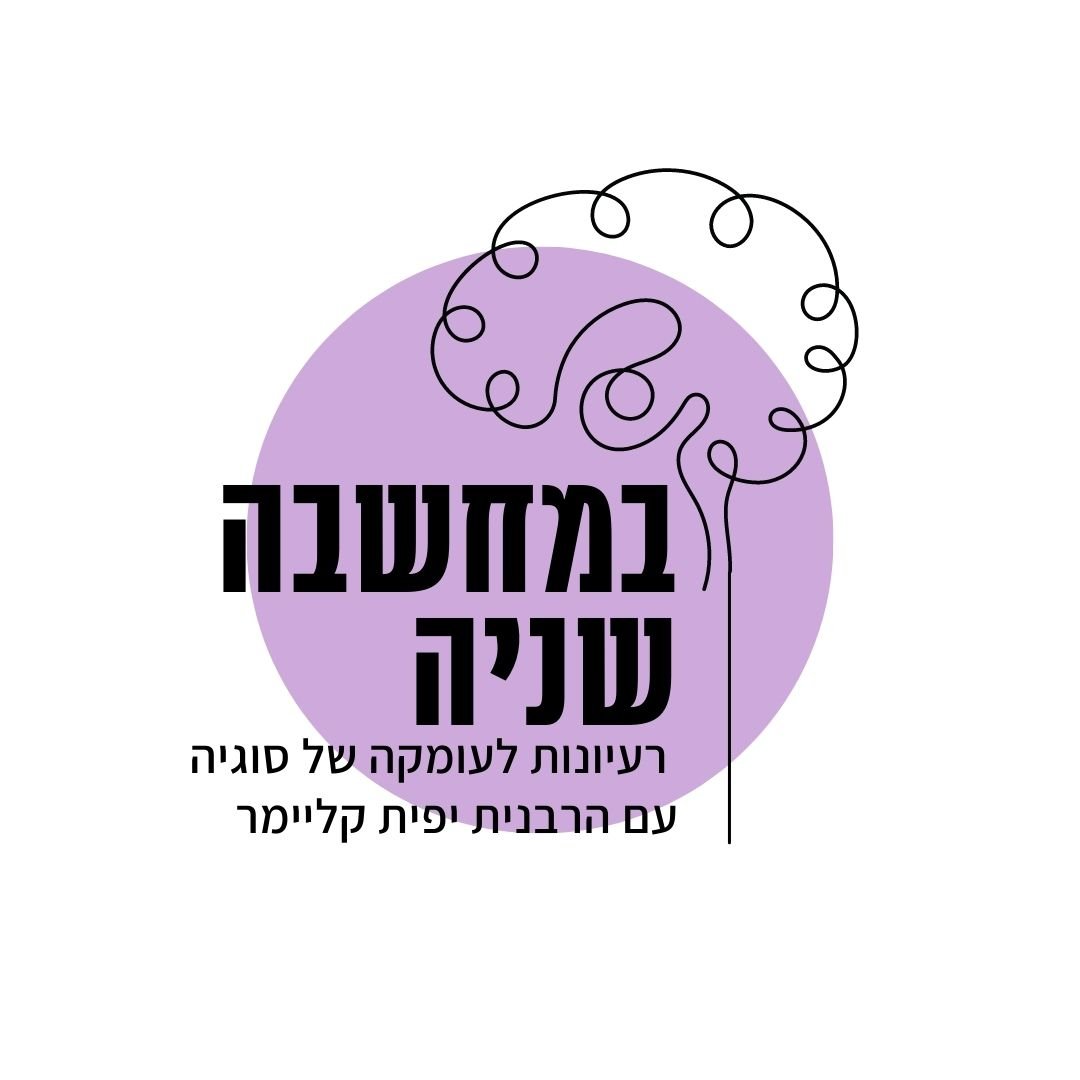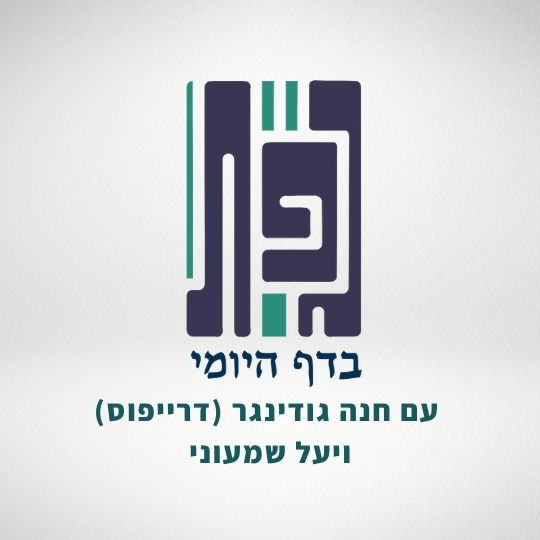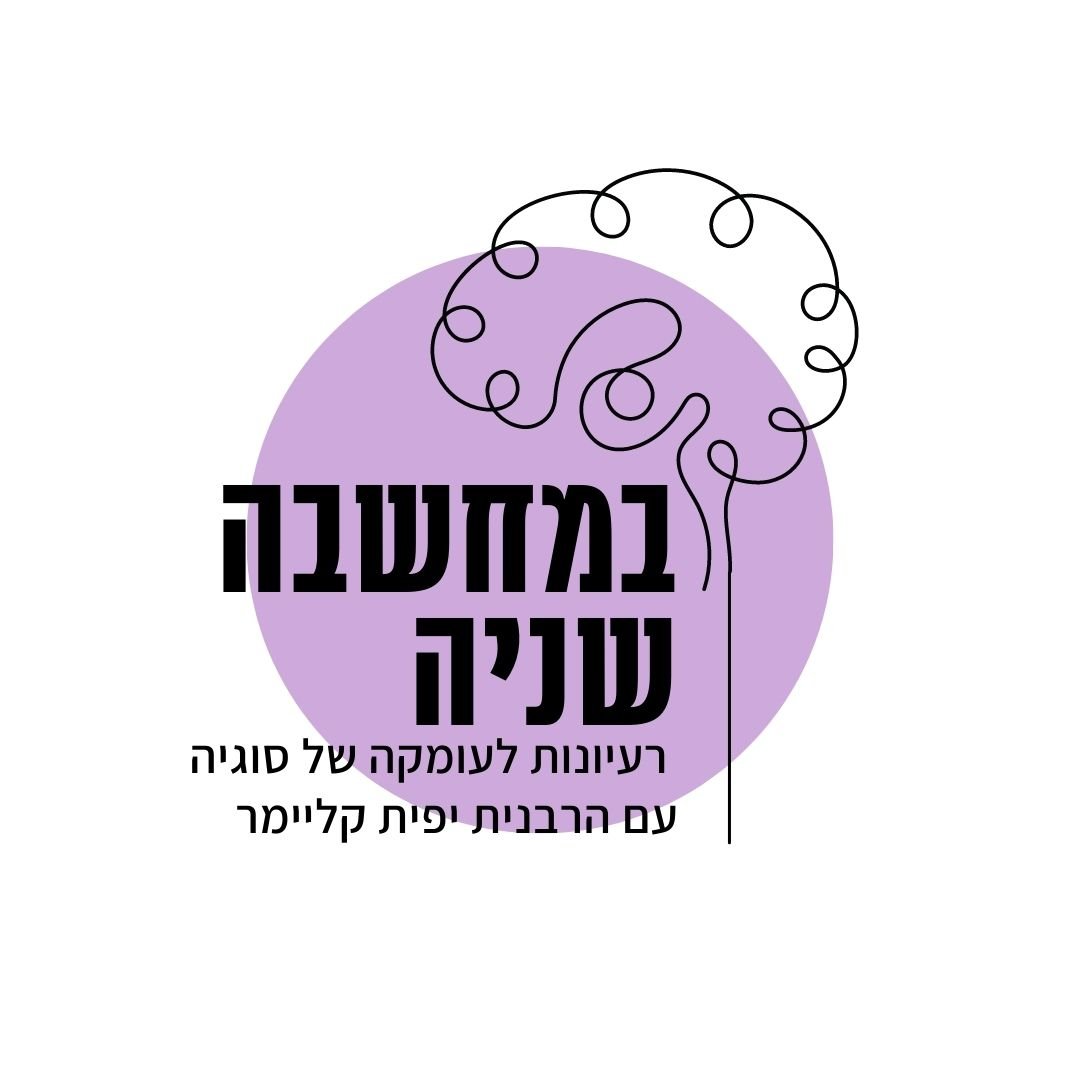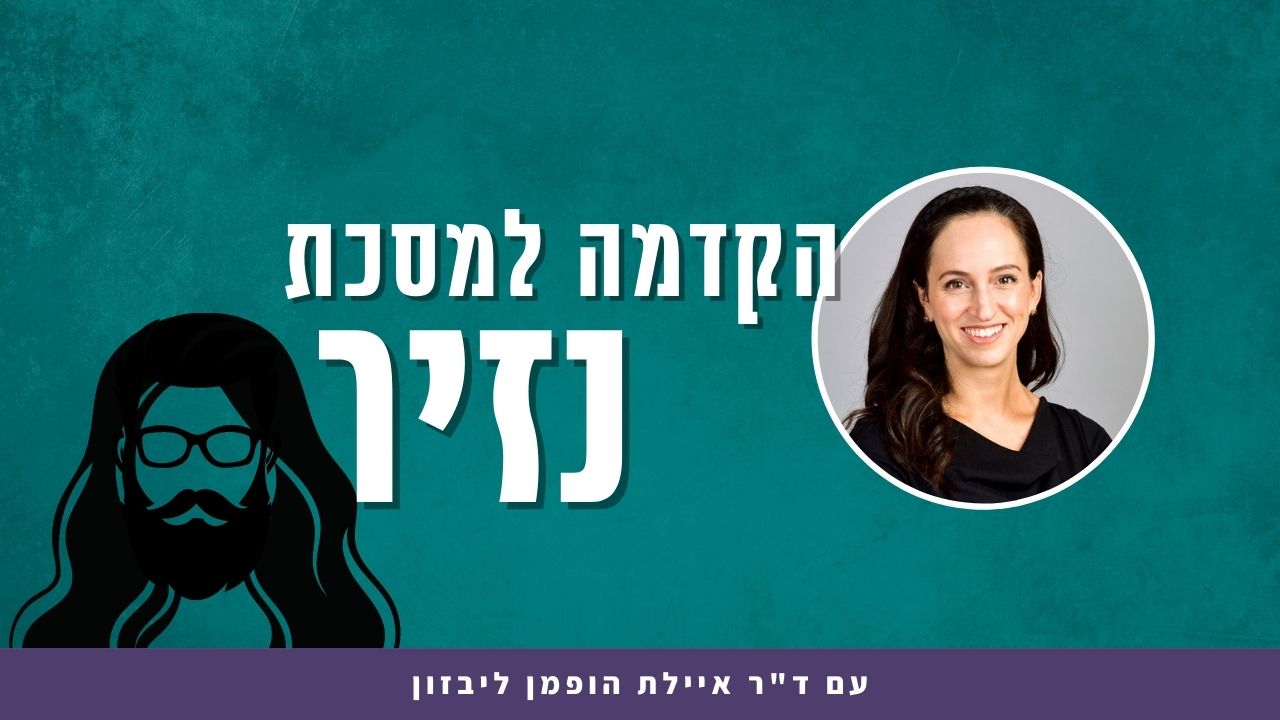נזיר ל
הָא בִּרְשׁוּתֵיהּ דַּאֲבוּהּ קָאֵים! אֶלָּא דְּאָמַר: אֱהֵא בִּשְׁבִיל אַבָּא, אֱהֵא בִּשְׁבִיל עַצְמִי.
After all, he still remains under his father’s authority with regard to naziriteship, as he has yet to develop two pubic hairs. Rather, one must explain that he said the following: I shall be a nazirite due to my father; I shall be a nazirite due to my own vow. In other words, he did not link his statement to the question of whether he was old enough to vow but to the issue of his father’s authority with regard to naziriteship, i.e., whether he had developed two hairs.
אִי אַיְיתִי שְׁתֵּי שְׂעָרוֹת מֵעִיקָּרָא — קָאֵים בִּנְזִירוּת דִּילֵיהּ, וּלְבַסּוֹף — קָאֵים בִּנְזִירוּת דַּאֲבוּהּ. וְאִי אַיְיתִי בְּמִצְעֵי מַאי?
The Gemara asks: According to the opinion of Rabbi Yehuda HaNasi, if he had developed two pubic hairs from the outset, i.e., before his father vowed, he would stand bound by his own naziriteship, and if he reached physical maturity at the end, i.e., after the vow ended, he would stand bound by his father’s vow of naziriteship. But if he developed two hairs in the middle of his naziriteship term, of what use would the son’s vow be?
הָנִיחָא לְרַבִּי יוֹסֵי בְּרַבִּי יְהוּדָה דְּאָמַר: עַד שֶׁיַּגִּיעַ לְעוֹנַת נְדָרִים.
The Gemara clarifies: This works out well according to the opinion of Rabbi Yosei, son of Rabbi Yehuda, who said that a father can vow on behalf of his son until he reaches the age of vows. The reason is that this stage is by rabbinic law, and therefore the fact that the son has reached this stage does not automatically cancel the father’s vow. The son would complete his term and bring his offerings.
אֶלָּא לְרַבִּי דְּאָמַר: עַד שֶׁיָּבִיא שְׁתֵּי שְׂעָרוֹת, מַאי אִיכָּא לְמֵימַר? אָמְרִי: לְרַבִּי לֵיכָּא תַּקַּנְתָּא עַד דְּיָתֵיב דִּילֵיהּ וְיָתֵיב דַּאֲבוּהִי.
However, according to the opinion of Rabbi Yehuda HaNasi, who said that a father can vow for his son only until he develops two pubic hairs, what can be said? If he grew two hairs during his father’s naziriteship it is no longer in effect, as by Torah law he is no longer under his father’s authority, so what is the halakha in that case? The Sages say in response: According to the opinion of Rabbi Yehuda HaNasi, this child has no rectification until he sits for his term of naziriteship and also sits for the naziriteship of his father, i.e., he must be a nazirite for sixty days, to ensure that he completes a full term of thirty days, either for his own naziriteship or for that of his father.
מַתְנִי׳ הָאִישׁ מְגַלֵּחַ עַל נְזִירוּת אָבִיו, וְאֵין הָאִשָּׁה מְגַלַּחַת עַל נְזִירוּת אָבִיהָ. כֵּיצַד? מִי שֶׁהָיָה אָבִיו נָזִיר, וְהִפְרִישׁ מָעוֹת סְתוּמִים עַל נְזִירוּתוֹ וָמֵת, וְאָמַר: ״הֲרֵינִי נָזִיר עַל מְנָת שֶׁאֲגַלֵּחַ עַל מְעוֹת אַבָּא״.
MISHNA: A man can shave, i.e., bring the offerings at the close of his term of naziriteship, by using offerings originally designated for his father’s naziriteship, but a woman cannot shave by means of the offerings for her father’s naziriteship. How so; how is this halakha applied? It applies to one whose father was a nazirite and separated unallocated money for his naziriteship, i.e., he did not state which coins were for which of his offerings, and he died before buying the animals, and the son said after his father’s death: I am hereby a nazirite on the condition that I will shave by means of the money that my father set aside.
אָמַר רַבִּי יוֹסֵי: הֲרֵי אֵלּוּ יִפְּלוּ לִנְדָבָה, אֵין זֶה מְגַלֵּחַ עַל נְזִירוּת אָבִיו. אֵיזֶהוּ שֶׁמְּגַלֵּח עַל נְזִירוּת אָבִיו? מִי שֶׁהָיָה הוּא וְאָבִיו נְזִירִים, וְהִפְרִישׁ אָבִיו מָעוֹת סְתוּמִים לִנְזִירוּתוֹ וָמֵת — זֶה הוּא שֶׁמְּגַלֵּחַ עַל נְזִירוּת אָבִיו.
Rabbi Yosei said: In that case these coins are allocated for communal gift offerings, and the son may not use them, as this is not the case of the halakha that a son can shave by using his father’s naziriteship. Rather, who is the son who can shave by using his father’s naziriteship? This is referring to a son and his father who were both nazirites during his father’s lifetime, and his father separated unallocated money for his naziriteship and died; this is the one who may shave by using his father’s naziriteship.
גְּמָ׳ מַאי טַעְמָא? אָמַר רַבִּי יוֹחָנָן: הֲלָכָה הִיא בְּנָזִיר. פְּשִׁיטָא! מַאי לְמֵימְרָא: דְּבֵן יוֹרֵשׁ אֶת אָבִיו, בַּת לָא?
GEMARA: The Gemara asks: What is the reason for this difference between a man and a woman? Rabbi Yoḥanan said: It is a halakha transmitted to Moses from Sinai with regard to a nazirite. The Gemara asks: It is obvious that this is so, even without this halakha. What is the purpose of stating this? Is Rabbi Yoḥanan coming to say that a son inherits from his father whereas a daughter does not, and therefore only a son who inherits from his father can use his animals, but not a daughter? This is obvious, as it is stated in the Torah that a daughter does not inherit from her father if he has a son (see Numbers 27:8).
לָא צְרִיכָא, דְּלֵית לֵיהּ אֶלָּא בַּת. מַהוּ דְּתֵימָא: יוֹרְשִׁין גְּמִירִין לָהּ,
The Gemara answers: No, this halakha is necessary in a case when he has only a daughter, who does inherit from him. Lest you say that we learned this halakha with regard to heirs, i.e., that the halakha is that all heirs, including a daughter, can shave by means of their father’s offerings,
קָא מַשְׁמַע לַן הֲלָכָה.
the mishna therefore teaches us that it is a halakha that is unrelated to inheritance; there is simply a tradition that a son can use the offerings for his father’s naziriteship while a daughter cannot.
אִיבַּעְיָא לְהוּ: פְּלִיגִי רַבָּנַן עֲלֵיהּ דְּרַבִּי יוֹסֵי, אוֹ לָא פְּלִיגִי? וְאִם תִּימְצֵי לוֹמַר פְּלִיגִי, אַרֵישָׁא אוֹ אַסֵּיפָא? תָּא שְׁמַע: כֵּיצַד אָמְרוּ הָאִישׁ מְגַלֵּחַ עַל נְזִירוּת אָבִיו?
§ A dilemma was raised before the Sages: Do the Rabbis disagree with Rabbi Yosei, or do they not disagree? If you say they disagree, do they take issue with the first clause or with the latter clause of his halakha? The Gemara suggests an answer: Come and hear the following baraita: How did the Sages say that a man can shave by using his father’s naziriteship?
מִי שֶׁהָיָה אָבִיו נָזִיר, וְהִפְרִישׁ אָבִיו מָעוֹת לִנְזִירוּתוֹ וָמֵת, וְאָמַר: ״הֲרֵינִי נָזִיר עַל מְנָת שֶׁאֲגַלֵּחַ עַל מְעוֹת אַבָּא״ — זֶהוּ שֶׁמְּגַלֵּחַ עַל מְעוֹת אָבִיו. אֲבָל מִי שֶׁהָיָה הוּא וְאָבִיו נְזִירִים, וְהִפְרִישׁ אָבִיו מָעוֹת לִנְזִירוּתוֹ וָמֵת — הֲרֵי אֵלּוּ יִפְּלוּ לִנְדָבָה, דִּבְרֵי רַבִּי יוֹסֵי.
With regard to one whose father was a nazirite and his father separated money for his naziriteship and died, and the son said: I am hereby a nazirite on the condition that I can shave by using my father’s money, this is the one who can shave by means of his father’s money. However, if a son and his father were both nazirites, and his father separated money for his own naziriteship and died, this money is allocated for communal gift offerings. This is the statement of Rabbi Yosei.
רַבִּי אֱלִיעֶזֶר וְרַבִּי מֵאִיר וְרַבִּי יְהוּדָה אָמְרוּ: זֶה הוּא שֶׁמְּגַלֵּחַ עַל מְעוֹת אָבִיו.
Rabbi Eliezer, and Rabbi Meir, and Rabbi Yehuda said: This is the one who can shave by using his father’s money. Their emphasis of: This is the one, indicates that they disagree with Rabbi Yosei entirely. In other words, where Rabbi Yosei rules that one can use his father’s money, they maintain that he cannot do so; and conversely, in a case where Rabbi Yosei says that one cannot spend his father’s money for his nazirite offerings, the Rabbis rule that he can do so.
בָּעֵי רַבָּה: יֵשׁ לוֹ שְׁנֵי בָנִים נְזִירִים, מַהוּ? הִילְכְתָא גְּמִירִין לַהּ: כֹּל דִּקְדֵים גַּלַּח — גַּלַּח, אוֹ דִילְמָא: יְרוּשָּׁה גְּמִירִין לַהּ, וּפַלְגָא הָוֵי?
§ Rabba raised a dilemma: If a father has two nazirite sons, what is the halakha? The Gemara clarifies the sides of the dilemma: Does one say that we learned it as a halakha that a son can shave using money left for his father’s naziriteship, and therefore any son who precedes his brother and shaves using his father’s money has shaved and gained the entire sum? Or perhaps we learned this halakha from the case of inheritance, and consequently, each receives a half?
בָּעֵי רָבָא: בְּכוֹר וּפָשׁוּט, מַאי? הִילְכְתָא גְּמִירִין לַהּ, וְהִילְכָּךְ לָא בָּעֵי גַּלּוֹחֵי לְפוּם מַאי דְּשָׁקֵיל. אוֹ דִילְמָא: יְרוּשָּׁה הִיא, וְכִי הֵיכִי דְּשָׁקֵיל פִּי שְׁנַיִם, הָכִי מְגַלַּח?
Similarly, Rava raised a dilemma: If one has two nazirite sons, a firstborn and a regular son, what is the halakha? Does one say that we learned it as a halakha that a son may shave using money left for his father’s naziriteship, and this ruling is unconnected to inheritance, and therefore he does not need to shave only in accordance with what he receives as an inheritance? Instead, either each son receives half the money, or whoever precedes the other receives the entire sum. Or perhaps it is an inheritance, and just as the firstborn takes a double portion of the estate, so too he shaves with a double portion of this money?
וְאִם תִּימְצֵי לוֹמַר: יְרוּשָּׁה הִיא, וּלְפוּם דְּשָׁקֵיל מְגַלַּח, וּבְחוּלִּין הוּא דְּאִית לֵיהּ פִּי שְׁנַיִם, אֲבָל בְּהֶקְדֵּשׁ לָא. אוֹ דִילְמָא: כֵּיוָן דְּקָנֵי לֵיהּ לְגִלּוּחַ, לָא שְׁנָא?
And if you say it is an inheritance and he shaves in accordance with the portion he receives, it is still possible that it is only with regard to non-sacred matters that a firstborn has a double portion, but with regard to consecrated property this halakha does not apply. Or perhaps, since he acquires that money, although he uses it for the purpose of shaving it is no different, i.e., it does not matter that the money is for a sacred matter.
אָבִיו נְזִיר עוֹלָם וְהוּא נָזִיר סְתָם, אָבִיו נָזִיר סְתָם וְהוּא נְזִיר עוֹלָם, מַאי? כִּי גְּמִירִין הִילְכְתָא, בִּסְתָם נְזִירוּת, אוֹ דִילְמָא לָא שְׁנָא?
The Gemara raises another dilemma: If his father was a permanent nazirite and he was an unspecified nazirite, or if his father was an unspecified nazirite and he was a permanent nazirite, what is the halakha? Can this son shave using money left for his father’s naziriteship? Does one say that when we learned the halakha that a son can shave using money left for his father’s naziriteship, this applies only in a case where they are both unspecified nazirites, or perhaps it is no different, and the same halakha applies even if their naziriteships are of two different kinds?
וְאִם תִּימְצֵי לוֹמַר: הָכָא אִידֵּי וְאִידֵּי, נְזִירוּת טׇהֳרָה, בָּעֵי רַב אָשֵׁי: אָבִיו נָזִיר טָמֵא, וְהוּא נָזִיר טָהוֹר. אָבִיו נָזִיר טָהוֹר, וְהוּא נָזִיר טָמֵא, מַאי? תֵּיקוּ.
And if you say: Here, both cases are at least similar in that they involve ritually pure naziriteship, and therefore the son can make use of his father’s money, then Rav Ashi raises a different dilemma: If his father was an impure nazirite and he was a pure nazirite, or if his father was a pure nazirite and he was an impure nazirite, what is the halakha? Can the son shave using money left for his father’s naziriteship or not? No answer was found for any of these dilemmas, and the Gemara says that they shall stand unresolved.
הַדְרָן עֲלָךְ מִי שֶׁאָמַר
בֵּית שַׁמַּאי אוֹמְרִים: הֶקְדֵּשׁ טָעוּת — הֶקְדֵּשׁ,
MISHNA: Beit Shammai say: Consecration that one performs in error nevertheless renders property consecrated,

